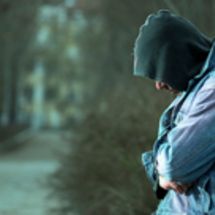
This week is Challenge Poverty Week, and Morag Gillespie of Glasgow Caledonian University would like to challenge the most extreme poverty she has found in Scotland.
Blog by Morag Gillespie, senior research fellow at the Scottish Poverty Information Unit at Glasgow Caledonian University
Last year, in a research project involving a survey and interviews, I came across the most extreme poverty I have witnessed in 12 years as a researcher on poverty in Scotland. The report of the study highlighted how hundreds of asylum seekers were destitute in Scotland, mainly in Glasgow.
Some of the people we surveyed had been in the asylum system for more than a decade and a third of those surveyed had been destitute for more than a year, some for as long as 5 or 6 years.
This includes families with children, pregnant women and new mothers.
Reasons for destitution
While some asylum seekers become destitute because of avoidable errors and delays, most of those trapped in destitution are refused asylum seekers who are denied any financial support. They are also banned from working, so they are left with no legitimate means of support.
Unable or unwilling to return home (often people have no realistic prospects of return) people are left in limbo.
This is no accident – destitution is built into government policy and effectively used to force people out of the UK.
However, this destitution is hidden from official records, so many people are unaware of the extreme poverty that refused asylum seekers can face – they are often shocked to learn that ‘destitution’ means people have no money at all and that so many people are in this situation in Scotland today.
Refusal is not the end
To be judged to have a legitimate claim for asylum one must have fled situations including conflict, war, persecution, or issues such as forced marriage or female genital mutilation.
If a need of safety can’t be proven, asylum will be refused.
However, it is important to note that quite a few of those refused asylum and made destitute have gone on to get refugee status on appeal.
This reinforces that they had legitimate claims for asylum, despite sometimes prolonged periods without money, food or shelter because of the UK government’s policy to make people destitute.
My suggestions
In these circumstances, hundreds of people need help every year from a wide range of organisations such as the Refugee Survival Trust and the Scottish Refugee Council, churches, community based organisations and individuals.
In the longer term, asylum seekers should have the right to financial support, accommodation and the right to work from when they arrive in the UK until they are granted leave to remain or they leave the UK. End to end support would not only reduce the risk of people being in extreme poverty, but would reduce the risks of income loss experienced in the current inefficient system of support.
As yet, there has been little progress towards a fairer and more efficient system to reduce the risks of destitution because of errors or delays or to end enforced destitution. So there remains an urgent need to improve the quality of official services for asylum seekers, including decision making, access to services and support.
Remember the human
We can all help in many ways, including cash and kind support for those organisations that provide a lifeline for people who are destitute, and by adding our voices to calls for change to a more humane system for asylum seekers.
However, until the rules change to stop the enforced destitution of refused asylum seekers, public services in Scotland need to find ways to do much more to reduce and mitigate destitution and homelessness.
To quote one of the interviewees:
“First of all, they must bear in mind you are also human beings. They must know you are human beings rather than treating us like you are nothing.”
The UK government may be inured to this plea, Scottish people and public services should not be and need to act now for change.
Trapped: Destitution and Asylum in Scotland. Report from Refugee Survival Trust, Scottish Refugee Council and British Red Cross, 2012. Full report and summary available at: http://www.stopdestitution.org.uk/learn.php
